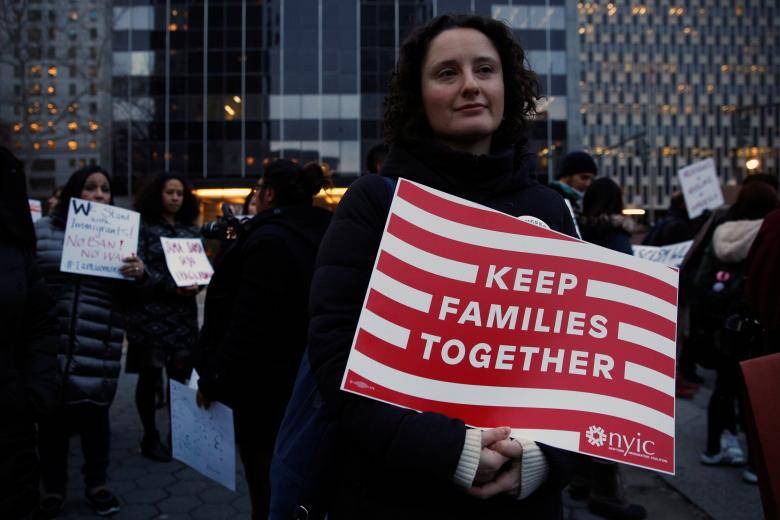President Donald Trump told Congress on Tuesday he was open to immigration reform, shifting from his harsh rhetoric on illegal immigration in a speech that offered a more restrained tone than his election campaign and first month in the White House.
Trump, in a prime-time address to a country that remains divided over his leadership, emphasized his desire to focus on problems at home by boosting the U.S. economy with tax reform, a $1 trillion infrastructure effort and an overhaul of President Barack Obama's signature healthcare law, known as Obamacare.
After a first month in office dominated by a fight over his temporary travel ban on people from seven Muslim-majority nations, Trump looked for a reset to move past a chaotic period that sowed doubts about his ability to govern effectively.
He called for national unity and showed a more measured tone, avoiding a repeat of his attacks on Democratic opponents and media organizations.
Democratic Senator Tom Carper said that "the person who wrote this speech must not have written the inaugural address. That one was "dark" and this one was more uplifting."
At his Jan. 20 inauguration, Trump painted a bleak picture of the country and described it as beset with "American carnage."
U.S. stock futures advanced at the start of Trump's address, but gave back some gains later in the speech.
Trump focused part of the speech on foreign policy, stressing his support for NATO but insisting allies pay more for their defense.
In a possible nod to his bid to warm relations with Russia, Trump said: "America is willing to find new friends, and to forge new partnerships, where shared interests align."
"We want harmony and stability, not war and conflict," said Trump, who said, however, he would embark on a big defense buildup.
Trump said a broad immigration reform plan was possible if both Republicans and Democrats in Congress were willing to compromise. He said U.S. immigration should be based on a merit-based system, rather than relying on lower-skilled immigrants.
Comprehensive immigration reform eluded his two predecessors because of deep divisions within Congress and among Americans over the issue. Trump said reform would raise wages and help struggling families enter the middle class.
"I believe that real and positive immigration reform is possible, as long as we focus on the following goals: to improve jobs and wages for Americans, to strengthen our nation's security, and to restore respect for our laws," said the Republican president, who took a hard line against illegal immigrants in his 2016 campaign.
Trump has used his early weeks in office to repeat vows to build a wall along the U.S.-Mexico border and intensify deportations of illegal immigrants who have committed crimes.
At the same time, he has expressed sympathy for children who entered the country when their parents crossed the border without proper authority, the "dreamers" who so far are protected by an ordered signed by Obama.
'MASSIVE TAX RELIEF'
Trump voiced a need to persuade Americans to rally behind his agenda after a bitterly fought election, but he made his argument in terms of urging people to rally behind his effort for a "new chapter of American greatness."
Trump said he wanted to provide "massive tax relief" to the middle class and cut corporate tax rates. But he did not offer specifics and failed to comment on the most pressing tax issue facing Congress, a proposed border adjustment tax to boost exports over imports.
Lawmakers have been looking to Trump for more leadership on an issue that has divided corporate America and Republicans in Congress.
Trump called on the Republican-led Congress to repeal and replace Obamacare with reforms that expand choice, increase access and lower costs.
Republicans remain divided on how to accomplish that goal and Democrats are ardently opposed to tampering with a system that provides health insurance for millions of low-income Americans.
Trump's comments lacked detail, but it was the first time he publicly supported tax credits, a nod to health insurers who say they are necessary to keep people in the market.
Former Kentucky Governor Steve Beshear said in the Democratic response to Trump's speech that "you and your Republican allies in Congress seem determined to rip affordable health insurance away from millions of Americans who most need it."
In the most emotional moment of the night, Trump singled out Carryn Owens, the widow of U.S Navy SEAL William "Ryan" Owens, who was killed in a raid on al Qaeda in Yemen.
Owens, tears streaming down her face, clasped her hands and looked upward from her spot in the balcony as lawmakers and the president applauded her in the longest ovation of Trump's hour-long speech.
Trump said the mission that her husband participated in obtained vital intelligence that could be used against Islamic militants, taking issue with news reports quoting U.S. officials who said little was gained from the raid.






